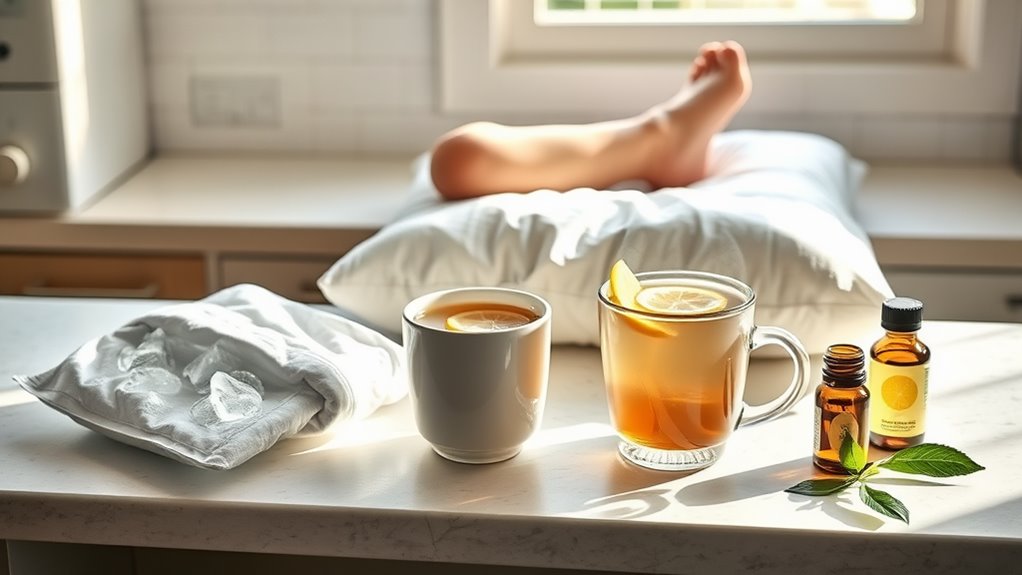Swelling Be Gone- 4 Remedies You Can Do at Home
You can quickly tackle swelling at home with these four evidence-based remedies. Start by applying a cold compress for 15-20 minutes to reduce inflammation and fluid buildup. Elevate the affected area above your heart to promote better drainage and improve circulation. Try herbal options like turmeric or ginger for their natural anti-inflammatory properties. Stay hydrated by drinking plenty of water to flush out excess sodium. Exploring these techniques further will boost your recovery journey.
Key Takeaways
- Apply a cold compress for 15-20 minutes to reduce swelling quickly.
- Elevate the swollen area above your heart to promote fluid drainage.
- Use turmeric or ginger as natural herbal remedies to ease inflammation.
- Drink 8-10 glasses of water daily to maintain hydration and reduce fluid buildup.
- Combine cold therapy with elevation for more effective swelling relief.
Cold Compress Method
One simple way to tackle swelling is with a cold compress. You achieve swelling reduction by applying cold therapy, which constricts blood vessels and minimizes fluid accumulation in the affected area.
Evidence from clinical studies indicates that this method effectively lowers inflammation within minutes. To do it right, wrap ice or a frozen pack in a thin cloth and hold it against the swollen site for 15-20 minutes at a time.
Repeat every few hours, but avoid direct skin contact to prevent frostbite. This simple technique offers quick relief for minor injuries or post-surgery recovery. For enhanced results, consider combining cold compress therapy with elevation techniques. However, while cold compresses provide temporary relief, they do not address the underlying cause of swelling, so consider natural alternatives for more comprehensive management.
Elevation Techniques
Another effective way to combat swelling involves elevating the affected area, which helps gravity drain excess fluid and reduce inflammation.
You’ll enhance this by positioning the swollen limb above your heart level, using pillows or a raised surface for support.
Studies, such as those in the Journal of Physiotherapy, show elevation decreases edema by improving lymphatic flow and reducing capillary pressure.
For best results, do it for 20-60 minutes multiple times daily, especially after physical activity.
It’s a simple, evidence-based method you can integrate easily into your routine, promoting faster recovery without added costs.
Always combine it with rest for optimal outcomes. Furthermore, ensuring adequate hydration levels can help prevent fluid retention and enhance the effects of elevation.
Additionally, incorporating gentle exercises can further improve circulation and help maintain fluid balance for better overall results.
Herbal Remedies
While elevation helps reduce swelling, you’ll find herbal remedies offer a natural complement by harnessing plants’ anti-inflammatory compounds. Additionally, Boswellia is another potent herb that blocks inflammatory pathways to further support inflammation management.
For instance, turmeric’s curcumin inhibits inflammatory pathways, so you can add it to meals or take supplements for quick relief.
Ginger, rich in gingerol, reduces edema when brewed as tea—sip it twice daily.
Arnica, applied topically as a cream, eases minor swelling from injuries.
Evidence from studies supports these uses, but consult your doctor first to ensure safety and avoid interactions.
Embrace these options for a holistic approach to managing inflammation.
To maximize benefits, consider preparing Golden Milk, a traditional turmeric-infused drink that also boosts antioxidant properties.
Hydration Strategies
Adequate hydration supports your body’s efforts to reduce swelling by balancing fluid levels and flushing out excess sodium. Evidence from health experts shows that maintaining fluid balance prevents fluid retention.
You should aim for 8-10 glasses of water daily, adjusting for activity, climate, and diet. Incorporate hydrating foods like cucumbers and watermelon to enhance intake. Ensuring proper hydration also helps in preventing dry mouth, which can disrupt comfort and overall health.
Avoid dehydrating beverages such as caffeine and alcohol, which increase sodium retention. Track your hydration with apps or by monitoring urine color—pale yellow signals optimal levels.
Consistent strategies like these actively promote swelling reduction and overall health. Additionally, staying hydrated aids in flushing out toxins and improving digestion.
